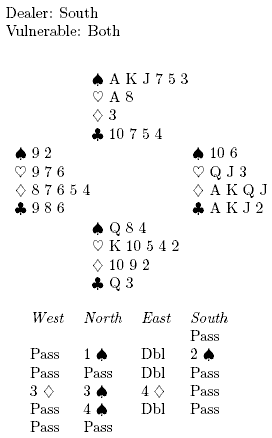
This deal occurred at a tournament in Mylapore Club. As West I held (for the first time in my life, as far as I remember) a Yarborough, so naturally my expectations from the deal were high.
East's second double was “please bid, partner” and my 3 ♦ was made in agony. But gloating over his honour stash, East could not resist doubling the final contract.
The lead was ♦ K and I ill-advisedly played ♦ 8 (“play top of sequence when not trying to win the trick”). Taking this to be encouragement (the correct interpretation would be that I held four diamonds), partner continued with a diamond.
After much stumbling, declarer made 10 tricks for +790. “A trump continuation will give me a hard time”, he grumbled. Partner was furious about my misleading play to the first trick. As you can see, declarer can get six spades and four tricks from the rounded suits.
The contract cannot be set by any defence. The play can proceed in a number of ways, but the fact is that the contract is remarkably good. With a random distribution of the remaining cards between East and West, the contract makes over 50 % of the time. If the honours are concentrated in one hand (as the bidding reveals), the chances of success are much improved.
The point here is that it is foolish to double four spades. True, you have four quicktricks. But it should be clear that North has considerable distributional assets, and setting the contract more than one seems unlikely. So the odds on the contract going down have to be at least 5 : 3 (−5 IMPs if they make the contract and +3 IMPs if you are able to set it one trick). Since East's quicktricks are concentrated in two suits and since West is guaranteed to produce no trick, the odds don't figure to be that high. You could argue that North's bidding was shaky, passing South's single raise, but I think the double was still wrong. Change East's 21 points to include the four aces, and the double is automatic.
The penalty double was not East's only bad call. When West passed South's two-spade bid, he denied having as many as six or seven points. From that point on, chances of game for East–West are pretty slim, unless West holds hearts, for which East doesn't have exceptional support. The second double is eminently correct because a partscore (at least) should certainly be sought. However, after North's 3 ♠, 4 ♦ is asking for trouble.
West may make only the four diamonds and the two top clubs. Realistically, West will most likely be able to finesse the clubs for six and a half tricks—seven sure tricks if he has the queen. A fifth diamond with West will provide one more. I think 7–8 tricks are the normal expectation. Passing 3 ♠ will almost certainly end the auction, and there is no dignity in getting socked for 500 or 800 “sacrificing” against 140 or 170. On the actual layout West can make eight tricks in diamonds. (Luck deserted us that board. At the other table, the result was an incredible 2NT bid and made by East.)
1 comment:
East shouldn't double at IMPs; at matchpoints the double is acceptable. For west, it is a tough decision to pull to 5D; as the cards lie, it will be down two or three depending upon how the hearts are played.
Post a Comment